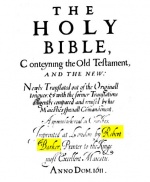Robert Barker (printer)
From Textus Receptus
m (Protected "Robert Barker (printer)" [edit=autoconfirmed:move=autoconfirmed]) |
|||
| Line 6: | Line 6: | ||
==King James Bible== | ==King James Bible== | ||
[[Image:Biblefrontisbarkerdetail.jpg|thumb|right|150px|Reproduction of part of the frontis of the first edition of the King James Bible highlighting Robert Barker]] | [[Image:Biblefrontisbarkerdetail.jpg|thumb|right|150px|Reproduction of part of the frontis of the first edition of the King James Bible highlighting Robert Barker]] | ||
| - | In 1611, Robert Barker printed the first edition of the King James Bible. | + | In 1611, Robert Barker printed the first edition of the [[King James Bible]]. The entire cost of the printing was undertaken by Barker who ultimately gained little financial reward but some fame for the work. The printing itself was substandard with uneven printing lines, the less modern "blackletter" typeface used was considered of poor quality, and many mistakes which were corrected in subsequent printings. |
==Imprisonment== | ==Imprisonment== | ||
Revision as of 09:19, 23 May 2009
Robert Barker (died 1645) was a printer to King James I and son of Christopher Barker (printer), printer to Queen Elizabeth I. Barker was most notably the printer of the King James Bible, arguably one of the most influential and important books ever printed in the English language.
Contents |
Official Printing Career
After working in the printing business for some time, Robert began working with his father's printing company in 1589, and inherited the printing house on November 29, 1599 upon his father's death. Most if not all of Robert's printing work was of an official nature, including prayer books, scriptures, and law books.
King James Bible
In 1611, Robert Barker printed the first edition of the King James Bible. The entire cost of the printing was undertaken by Barker who ultimately gained little financial reward but some fame for the work. The printing itself was substandard with uneven printing lines, the less modern "blackletter" typeface used was considered of poor quality, and many mistakes which were corrected in subsequent printings.
Imprisonment
In 1635, Barker was imprisoned. In spite of working on what should have been very lucrative business, Robert was not a good businessman and it may well have been this lack of experience and desperation that led him into trouble with the law. In and out of prison for the next 10 years, Barker ultimately died there in 1645.
References
- Plomer, Henry R.A Short History of English Printing 1476-1898. (London, 1900).

